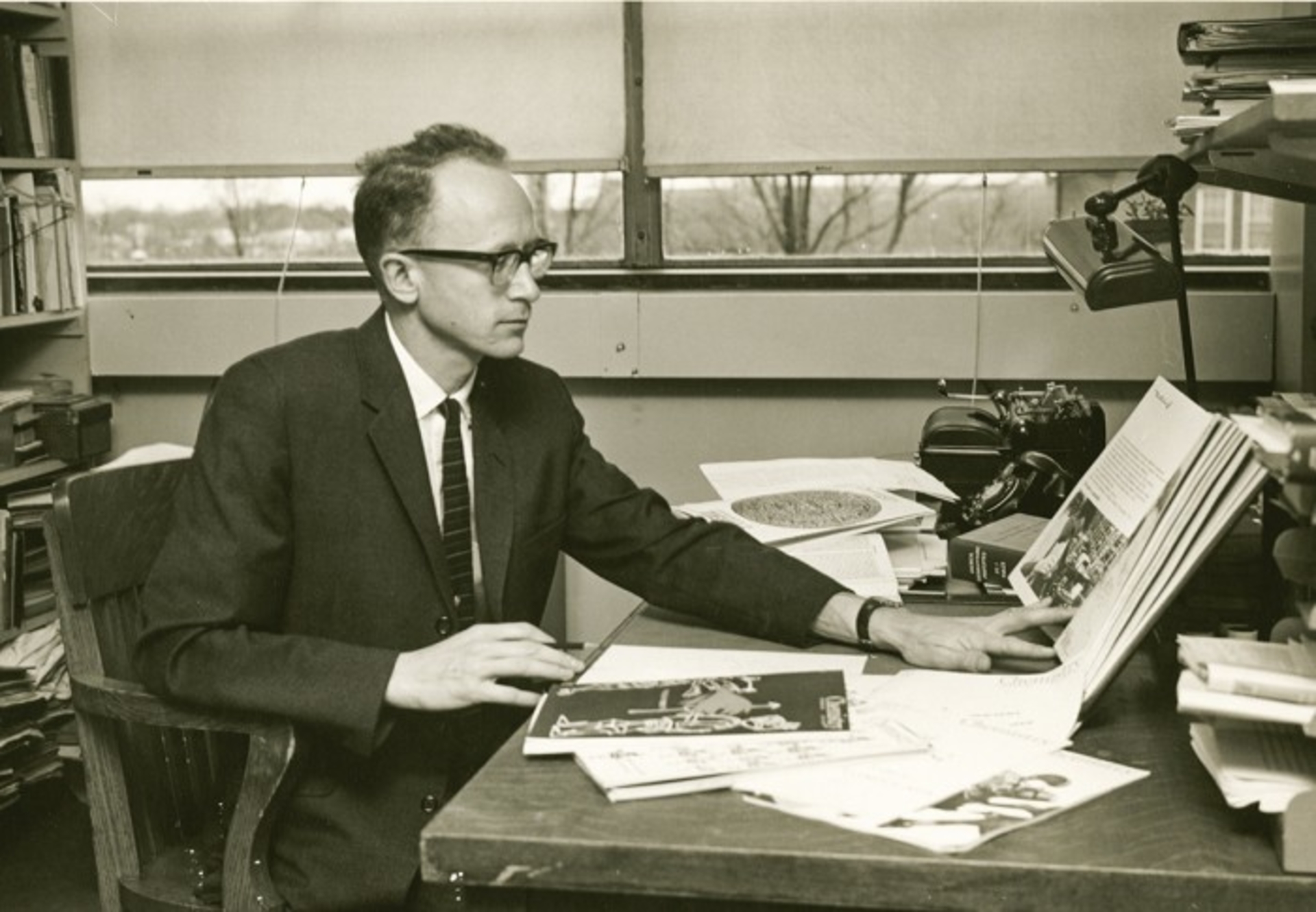
In the Chemistry professor's eyes, a Guilford education required students to examine how science influenced world events and everyday lives.
“It hurts me when people go in learning straight Math or Organic Chemistry with little exposure to other disciplines. I’m so grateful for Ted and Guilford for offering just the opposite.”
After taking over as director of the Chemistry Department in 1973, one of the late Ted Benfey’s first acts was to blow up the way Guilford students were taught in labs. At the time, Chemistry was taught using expository instruction, or “cookbook” teaching, the same pedagogical approach most colleges and universities practiced then.
“Cookbook” teaching requires students to follow explicit instructor directions or a step-by-step manual to reach a predetermined outcome. That was the problem. Ted abhorred the practice of rote memorization at a liberal arts college like Guilford. David MacInnes, a retired Guilford Chemistry professor and longtime colleague of Ted, says the explanatory method still found at some larger universities treats students more like numbers than individuals.
“There was no attention given to the development of student’s critical thinking skills or to the interpretation of the results of the experiment,” says David.
Ted, says David, believed fiercely that a liberal arts college had a calling to unearth and nurture the innate curiosity and creativity within every student. When classes started that fall, there were no “cookbooks” waiting for students on their lab tables in King Hall.
“We made inquiry labs where students didn’t know what was going to happen,” says David. “Ted told them, ‘try this and see what happens and then decide what you want to do next.’”
A half century is a long time to hold on to specifics. David vaguely recalls students hesitant to the new approach. But all these years later, the lasting impact of Ted’s new way of teaching Chemistry remains clear. “Once they became empowered, they flourished,” says David. “Not just as chemists, but as individual, critical thinkers.”
Ted and David even wrote a book on their new teaching method, which was quickly adopted by other North Carolina colleges and universities. Ted, who retired in 1988 after 15 years at Guilford, died Jan. 28, but not before instilling thousands of Guilfordians with his passion for exploring new ideas and concepts and finding those web-thin filaments connecting science, philosophy and art.A beautiful mind
That’s certainly what Sarah Ladd ’80 remembers most about her Organic Chemistry professor. “In one class Ted would bring up history and people and politics and World War II and scientists brought to America after the war to work and tie them into the lesson that day,” says Sarah. “He would reflect on the personalities of those scientists, he would weave in Quaker principles. So technically you had this class in organic chemistry but it was also a class in history and sociology and religion. I loved every class.”
Jane Anderson ’77 was a 16-year-old first-year student at Guilford the same year Ted arrived at Guilford. She was immediately drawn to how Ted, like many Guilford professors today, had a gift for exploring and teasing out connections between seemingly disparate thoughts and encouraged students to do the same.
“He was always helping us see those kinds of connections between science and, say, a Philosophy class,” says Jane. “And there was such a sense of humility and grace in the way Ted did that – in everything he did, really. He could take the most complex, obtuse idea or theoretical system and convey them in a person-on-the-street kind of language to someone like me, a college freshman, who would understand exactly what he was talking about. That way of communicating with others? Of listening and understanding other people’s thoughts and ideas? That was a gift I learned at Guilford with Ted. I still use those thinking and communication skills in my work and life today.”
Ted had a genius for bringing science to life in Guilford’s classrooms. He was a small man in height, but students say his presence in a lab was enormous. With his gift of teaching and experiential learning, he endowed chemical principles with wide-eyed drama, hands whirling above test tubes and Bunsen burners. Amid explosions and swishing clouds of carbon dioxide he guided – never lectured – Guilford students through the mysteries of Organic Chemistry with contagious enthusiasm.
“His arms would be flying through the air with a great grin on his face,” says Sarah, a retired school teacher living in Greensboro. “You could tell how delighted he was about a chemical compound. He enjoyed it when we saw the same connections he saw and he loved it when we introduced him to concepts he’d never thought of.”
At Ted’s urging, Sarah says she enrolled in so many courses across so many disciplines that she didn’t declare a major until her senior year, yet another benefit of attending a liberal arts college like Guilford.
“Virtually any class, there was always a connection to the greater world and other disciplines,” she says. “I can’t see educating any other way.
“It hurts me when people go in learning straight Math or Organic Chemistry with little exposure to other disciplines. I’m so grateful for Ted and Guilford for offering just the opposite.”

